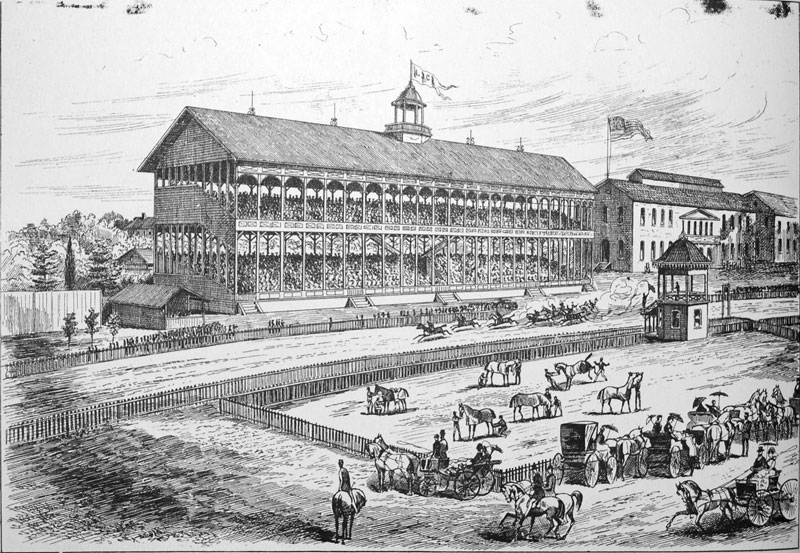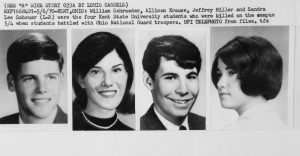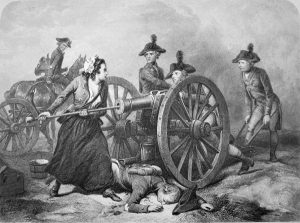Horse racing in North America began almost as soon as Europeans settled the colonies. The first racetrack, called the New Market, was established in 1665 near the site of the present-day garden city of Long Island in New York. Tracks rapidly developed wide appeal among the citizens, and horse racing spread along the Atlantic Coast quickly.1 By the time of the American Revolution, horse racing had already become popular in almost every colony. Moreover, it was moving well into the newly settled areas of the Southwest. Andrew Jackson was a founder of the first racing track in Nashville, Tennessee, in the early nineteenth century. By the 1800s, Kentucky had eight racetracks, due to its native bluegrass being recognized as ideal for grazing horses.2

Horse racing becomes much more important when we analyze life in early American society. Like almost everything else in the life of early America, the world of horse racing was separated by strong lines of class and race.3 For many years, it was considered the exclusive enjoyment for the rich gentleman. In 1674, a court in Virginia gave a fine to James Bullock, a tailor, who proposed a race. It was against the law for a laborer to make a race, and according to the court, horse racing was a sport exclusive to only rich gentlemen. While aristocrats retained control of racing, they were not the only people who participated. Southern aristocrats often trained young male slaves as jockeys for their horses, and northern horse owners employed the services of free blacks as riders. In America, African Americans eventually emerged as some of the most talented and experienced trainers of racing horses. Horse racing became very popular among the public. Despite social and legal pressures, free blacks and poor whites often staged their own informal races.4
Racing also reflected the growing sectional rivalry between the North and the South. In 1824, the Union Race Course on Long Island established an astounding $24,000 prize for a race between two famous thoroughbreds: American Eclipse from the North, and Sir Henry from the South. Surprisingly, the race between Eclipse and Sir Henry was America’s first national event.5 Eclipse won two of the three heats, but Sir Henry prevailed in another such celebrated contest in 1836. These intersectional races, which drew enormous crowds and created tremendous publicity, continued into the 1850s, until the North-South rivalry began to take a deadly turn.6

Horse racing remained popular after the Civil War, but two major developments changed its character considerably. The first development was the successful effort to drive African-Americans out of the sport. At least until in the 1890s, black jockeys and trainers remained central to racing. At the first Kentucky Derby, in 1875, fourteen of the fifteen horses had African American jockeys. Isaac Murphy, a black man, won a remarkable 44 percent of all races, including three Kentucky Derbies. Gradually, however, the same social dynamics that enforced racial segregation in so many other areas of American life penetrated to horse racing as well. By the beginning of the twentieth century, white jockeys and organized jockey clubs had driven almost all black riders and many black trainers out of the sport.7
The second change was the introduction of formalized betting in the sport. In the late nineteenth century, racetracks began creating betting systems to lure customers to the races. Race horses were moving into the hands of enormously wealthy families, and the audience for racing was becoming increasingly working class and lower middle class. The people who now came to tracks were mostly white men, and some white women, who were lured to the races not by the love of horses, but by the usually futile hope of quick and easy riches through gambling.8
As soon as the horse racing ideology was offered to the American society, the public showed great affection. Horse racing has become known as one of the most popular sports in America. Over time its development exposed the changes American society has gone through. Horse racing is still popular in America today, so popular in fact that a three famous races, the Kentucky Derby, the Preakness Stakes, and the Belmont Stakes, known together as the Triple Crown, are still held every May and June.
- Alan Brinkley, American History: Connecting with the Past Volume 2, 15 edition (New York: McGraw-Hill Education, 2014), 156. ↵
- Richard Locker, “Will horse racing and betting make a comeback in Tennessee?” Commercial Appeal, accessed December 6, 2016, http://archive.commercialappeal.com/news/government/state/will-horse-racing—-and-betting-on-them—-make-a-comeback-in-tennessee-327f1df7-521b-7209-e053-010-379234621.html. ↵
- Brinkley, American History: Connecting with the Past Volume 2, 15 edition, 156. ↵
- Brinkley, American History: Connecting with the Past Volume 2, 15 edition, 156. ↵
- Henry Cecil, The Racing Post: A Great Knight (London, Business Insights, 2011), 2. ↵
- Cecil, The Racing Post: A Great Knight, 2. ↵
- Brinkley, American History: Connecting with the Past Volume 2, 15 edition, 156. ↵
- Brinkley, American History: Connecting with the Past Volume 2, 15 edition, 156. ↵



77 comments
Roman Olivera
Its crazy to think that is was once only considered a wealthy white entertainment sport with black riders on the horses. Was anything without racism in this country? To use black people to raise, breed, training and ride there horses and then try to banish then from the sport. Most of the people you see around the track these days betting on horses are not the wealthy, just some poor sucker pouring their money into the races and going home broke. It is funny to see the wealthy dressed ridiculous and the women in their huge crazy hats thinking it gives them status. I think they just look really stupid, but what do they care, their rich!
Cynthia Rodriguez
I have personally never been to a horse race, but I have always found them to be fun to watch on TV. I find it interesting that they were once separated by class and race. It shocked me to read that it was against the law for a laborer to make his own race. I also found it interesting that black jockeys and trainers were central to horse races, yet they managed to drive them out of the sport. This article was enjoyable to read and I learned a lot about horse racing that I didn’t before. Great job and nice images.
Hailey Rodriguez
I have always dreamed about going to the Kentucky Derby one day. I have always found horse racing interesting and elegant. I did not know that in the beginning most the jockeys and coaches were African American, I would have never guessed, as it still seems to be pretty much a white sport. To me, it seems unfair that African Americans could not go to these events even though it was primarily their people racing. I also think that it is unfair that they eventually got driven out of the sport all together even though they were the ones who helped it become popular.
Luke Lopez
This was a very interesting article about horse racing in America. I have little knowledge of the history of horse racing in America, but I now know that it was a rich man’s sport and these rich men used either free blacks or slaves as jockeys. As horse racing gained popularity, betting was introduced so people could gamble on horses and hopefully win money for themselves.
Didier Cadena
This was a very interesting article. I had no idea about the extensive history of horse racing in the U.S. I had no idea about how horse racing was something that represented social status and wealth. I enjoyed the way that you formatted your article, because it kept me hooked. I wouldn’t have thought that the history of horse racing would be a fun thing to do, but this article helped me see otherwise.
Julio Morales
This article was great, I learned that the race between Eclipse and Sir Henry was the first national event. I always thought it would be baseball or another major sport. I also found it very interesting how a laborer couldn’t organize a race because it was against the law and was only for the rich class. I also would have never guessed that the first track was built in New York. My first guess would have been Kentucky since the Kentucky derby is there. I may not know a lot about horse racing but I think everybody not living under a rock knows about the Kentucky derby.
Jose Figueroa
Horse racing was something I never knew much about but never bothered looking much into. All I know about it, was that I went sometime when I was very young and never seen it since. I never knew how big of a sport that it actually used to be. Baseball is known as Americas past time now, but back then it would be these humongous horse races. A very interesting article!
Auroara-Juhl Nikkels
This was a very well written article. I do not know very much about horse racing, but I was surprised to learn so much about horse racing, like the fact that the first jockeys were African American. I would not have thought that. I knew that this was an event pretty much only for the upper class. Very good job!
Timothy ODekirk
Ah, horse racing. I remember when I first went to the horse races and I remember loving it ever since. However, I was unaware that there was such an extensive background and history of horse racing. I was unaware how old horse racing really is in the United States. What intrigued me the most about the interesting article was the fact that African Americans used to make up the majority of horse racing jokeys during the early years of horse racing. However, it is sad to know that most African American Jockey were eventually kicked out of horse racing due to segregation. The history of horse Racing is an interesting topic and was an extremely intriguing article to have read.
Luis Morales
This was an interesting subject that I don’t know a lot about. I never knew and find it ironic that African-Americans played major part in the success of the sport of horse racing. I also found it interesting that even in horse racing, one could tell that the North and South were headed in a direct of conflict. This was an interesting article!